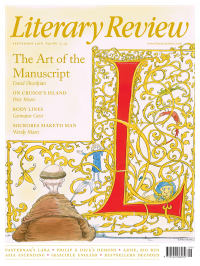Patricia Duncker
Body Blows
Orphans of the Carnival
By Carol Birch
Canongate 380pp £14.99
Neo-Victorian fiction delights in freaks, curiosities and the monstrous, as did the Victorians. Carol Birch’s new book, a biographical novel about Julia Pastrana, a genuine performing freak, self-consciously incorporates several common characteristics of contemporary neo-Victorian writing. The novel is ‘based on a true story’ and follows the high road of the historical record rather than burrowing into the suggestive gaps. Birch also employs a double narrative. Julia’s story begins in the 1850s with her debut on Broadway, while a parallel, modern narrative set in Thatcher’s England (remember her famous suggestion that we should all embrace Victorian values) opens in a household of marginal eccentrics and aged-hippy types living on society’s border.
The real Julia Pastrana was a bearded lady, variously known as the ape woman, the baboon lady, the bear woman or the missing link. Her entire body was covered in thick hair. Her genetic condition is now known as hypertrichosis lanuginosa. She was examined by numerous doctors and

Sign Up to our newsletter
Receive free articles, highlights from the archive, news, details of prizes, and much more.@Lit_Review
Follow Literary Review on Twitter
Twitter Feed
It wasn’t until 1825 that Pepys’s diary became available for the first time. How it was eventually decrypted and published is a story of subterfuge and duplicity.
Kate Loveman tells the tale.
Kate Loveman - Publishing Pepys
Kate Loveman: Publishing Pepys
literaryreview.co.uk
Arthur Christopher Benson was a pillar of the Edwardian establishment. He was supremely well connected. As his newly published diaries reveal, he was also riotously indiscreet.
Piers Brendon compares Benson’s journals to others from the 20th century.
Piers Brendon - Land of Dopes & Tories
Piers Brendon: Land of Dopes & Tories - The Benson Diaries: Selections from the Diary of Arthur Christopher Benson by Eamon Duffy & Ronald Hyam (edd)
literaryreview.co.uk
Of the siblings Gwen and Augustus John, it is Augustus who has commanded most attention from collectors and connoisseurs.
Was he really the finer artist, asks Tanya Harrod, or is it time Gwen emerged from her brother’s shadow?
Tanya Harrod - Cut from the Same Canvas
Tanya Harrod: Cut from the Same Canvas - Artists, Siblings, Visionaries: The Lives and Loves of Gwen and Augustus John by Judith Mackrell
literaryreview.co.uk